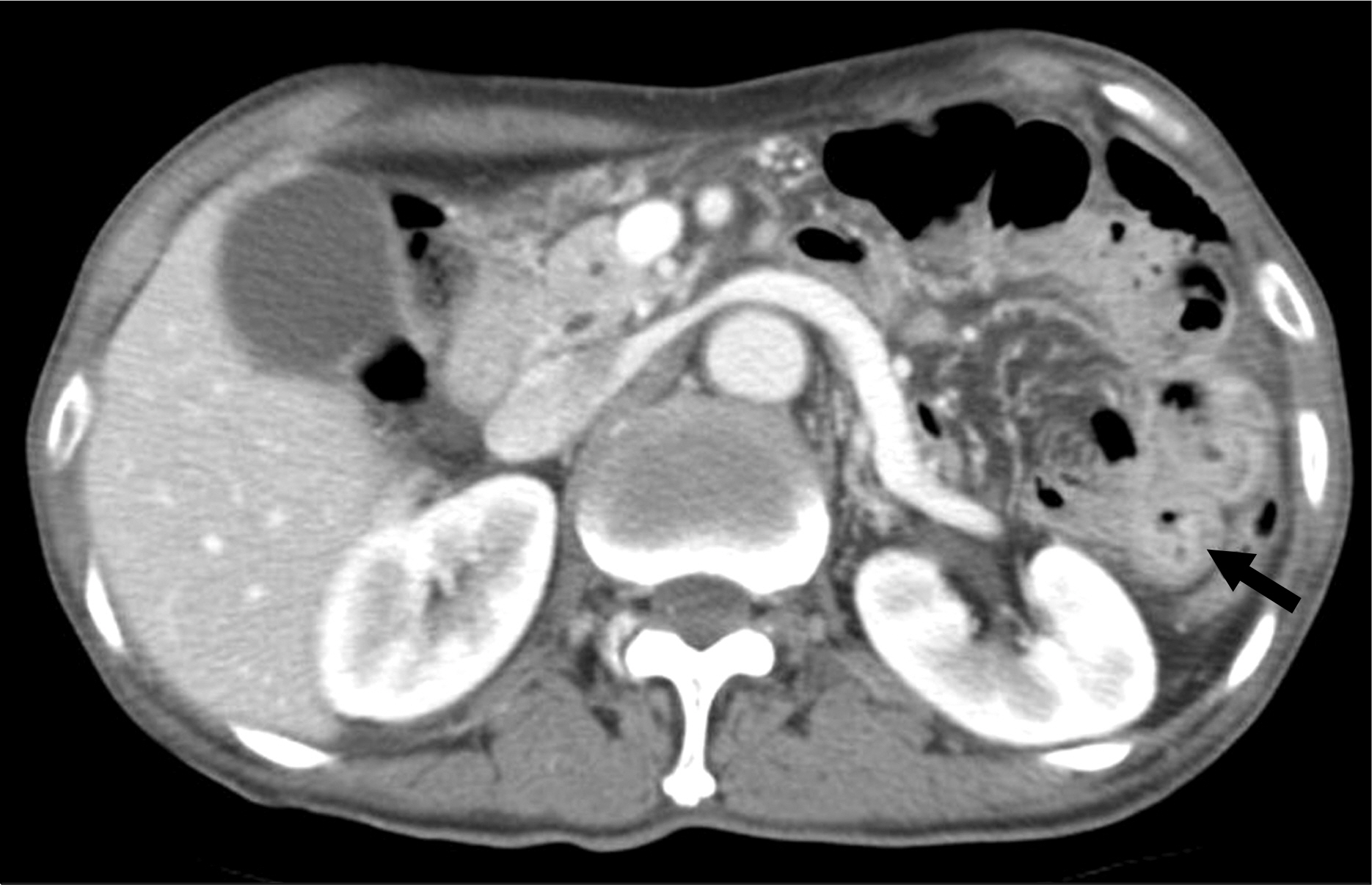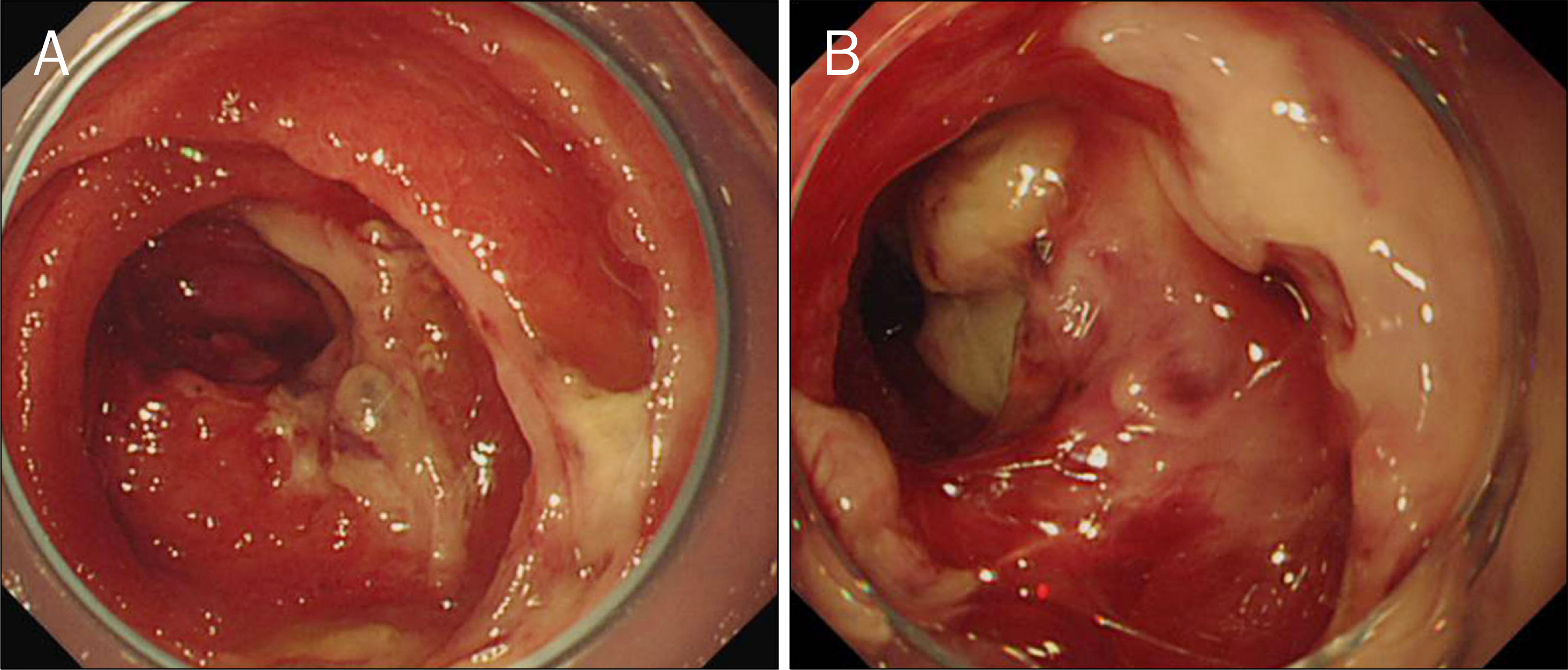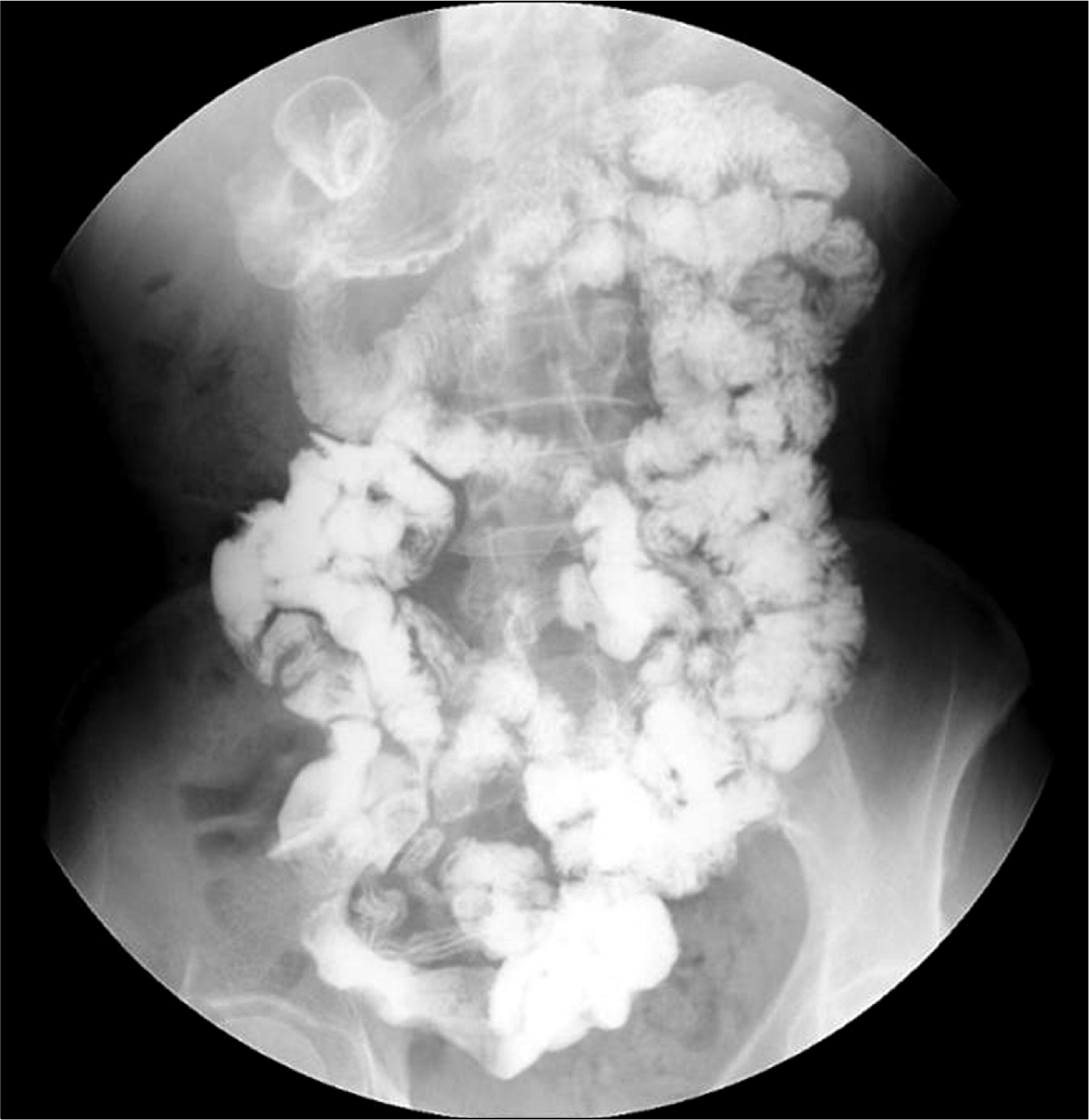Korean J Gastroenterol.
2013 Oct;62(4):238-242. 10.4166/kjg.2013.62.4.238.
Cytomegalovirus Jejunitis Diagnosed with Single-Balloon Enteroscopy
- Affiliations
-
- 1Department of Internal Medicine, Konkuk University School of Medicine, Seoul, Korea. csshim@kuh.ac.kr
- KMID: 1792743
- DOI: http://doi.org/10.4166/kjg.2013.62.4.238
Abstract
- Cytomegalovirus (CMV) infections are usually diagnosed in immunocompromised patients. A 74-year-old male without any significant medical history visited our center because of abdominal pain and diarrhea which began about a month ago. Abdominal computed tomography revealed segmental enhanced bowel wall thickening on jejunum and single-balloon enteroscopy showed multiple geographic shaped ulcerations covered with exudates on proximal jejunum. Biopsy samples taken during endoscopic examination demonstrated necrotic fibrinopurulent tissue debris and benign ulcer. Nested-PCR analysis of CMV DNA from jejunal tissue was positive. The patient was finally diagnosed with CMV jejunitis and was treated by intravenous ganciclovir for 14 days after which, abdominal pain and diarrhea improved. Our case shows that CMV jejunitis can occur in an immunocompetent adult as multiple jejunal ulcers which can be diagnosed using a single-balloon enteroscope.
MeSH Terms
-
Aged
Antiviral Agents/therapeutic use
Cytomegalovirus/genetics/isolation & purification
Cytomegalovirus Infections/complications/*diagnosis/drug therapy
DNA, Viral/analysis
Endoscopy, Gastrointestinal
Enteritis/*diagnosis/etiology/virology
Ganciclovir/therapeutic use
Humans
Injections, Intravenous
Jejunal Diseases/*diagnosis/etiology/virology
Male
Polymerase Chain Reaction
Tomography, X-Ray Computed
Antiviral Agents
DNA, Viral
Ganciclovir
Figure
Reference
-
References
1. Galiatsatos P, Shrier I, Lamoureux E, Szilagyi A. Meta-analysis of outcome of cytomegalovirus colitis in immunocompetent hosts. Dig Dis Sci. 2005; 50:609–616.
Article2. Einbinder Y, Wolf DG, Pappo O, Migdal A, Tsvang E, Ackerman Z. The clinical spectrum of cytomegalovirus colitis in adults. Aliment Pharmacol Ther. 2008; 27:578–587.
Article3. Hinnant KL, Rotterdam HZ, Bell ET, Tapper ML. Cytomegalovirus infection of the alimentary tract: a clinicopathological correlation. Am J Gastroenterol. 1986; 81:944–950.4. Cha JM, Lee JI, Choe JW, et al. Cytomegalovirus enteritis causing ileal perforation in an elderly immunocompetent individual. Yonsei Med J. 2010; 51:279–283.
Article5. Underwood JC, Corbett CL. Persistent diarrhoea and hypo-albuminaemia associated with cytomegalovirus enteritis. Br Med J. 1978; 1:1029–1030.
Article6. Han KJ, Jung IS, Kim CK, et al. A case of CMV disease of the jejunum in a patient with non-Hodgkin's lymphoma. Korean J Intern Med. 1998; 13:143–146.7. O'Mahony S, Shanahan F. Enteric microbiota and small intestinal bacterial overgrowth. Feldman M, editor. Sleisenger and Fordtran's gastrointestinal and liver disease, Volume 2. 9th ed.Philadelpia: Elsevier Saunders;2010. p. 1769–1778.8. Ross SA, Arora N, Novak Z, Fowler KB, Britt WJ, Boppana SB. Cytomegalovirus reinfections in healthy seroimmune women. J Infect Dis. 2010; 201:386–389.
Article9. Papadakis Ka, Tung JK, Binder SW, et al. Outcome of cytomegalovirus infection in patients with inflammatory bowel disease. Am J Gastroenterol. 2001; 96:2137–2142.10. Huh CW, Youn YH, Jung DH, et al. A case of cytomegalovirus colitis with endoscopic finding resembling Crohn's disease. Korean J Gastroenterol. 2012; 59:303–307.
Article11. Kalkan IH, Dağ li U. What is the most accurate method for the diagnosis of cytomegalovirus (CMV) enteritis or colitis? Turk J Gastroenterol. 2010; 21:83–86.
Article12. Ina S, Tani M, Takifuji K, Yamazoe S, Nakatani Y, Yamaue H. Virus-associated hemophagocytic syndrome and hemorrhagic jejunal ulcer caused by cytomegalovirus infection in a non-com-promised host; a case report of unusual entity. Hepatogastroenterology. 2004; 51:491–493.13. Petrogiannopoulos CL, Kalogeropoulos SG, Dandakis DC, et al. Cytomegalovirus enteritis in an immunocompetent host. Chemotherapy. 2004; 50:276–278.
Article14. DeRiso AJ 2nd, Kemeny MM, Torres RA, Oliver JM. Multiple jejunal perforations secondary to cytomegalovirus in a patient with acquired immune deficiency syndrome. Case report and review. Dig Dis Sci. 1989; 34:623–629.15. Nabeshima K, Sakaguchi E, Inoue S, Eizuru Y, Minamishima Y, Koono M. Jejunal perforation associated with cytomegalovirus infection in a patient with adult T-cell leukemia-lymphoma. Acta Pathol Jpn. 1992; 42:267–271.
Article16. Yasunaga M, Hodohara K, Uda K, et al. Small intestinal perforation due to cytomegalovirus infection in patients with non-Hodgkin's lymphoma. Acta Haematol. 1995; 93:98–100.
Article17. Mathew AT, Zacharias P, Ponnambathayil S, et al. Massive gastrointestinal bleeding in a patient with AIDS. Natl Med J India. 2005; 18:76–77.18. Petplook E, Manuyakorn A, Manatsathit S. Cytomegalovirus jejunitis with jejunal perforation in immunocompetent host. Thai J Gastroenterol. 2007; 8:84–87.19. Morunglav M, Theate I, Bertin G, Hantson P. CMV enteritis causing massive intestinal hemorrhage in an elderly patient. Case Report Med. 2010; 2010:1–4.
Article20. Shah SK, Kreiner LA, Walker PA, et al. Cytomegalovirus enteritis manifesting as recurrent bowel obstruction and jejunal perforation in patient with acquired immunodeficiency syndrome: rare reports of survival and review of the literature. Surg Infect (Larchmt). 2012; 13:121–124.
- Full Text Links
- Actions
-
Cited
- CITED
-
- Close
- Share
- Similar articles
-
- Does Single Balloon Enteroscopy Have Similar Efficacy and Endoscopic Performance Compared with Double Balloon Enteroscopy?
- Diagnostic and Therapeutic Capability of Double-Balloon Enteroscopy in Clinical Practice
- Deep Enteroscopy: Which Technique Will Survive?
- A Case of Primary Small Bowel Melanoma Diagnosed by Single-Balloon Enteroscopy
- Two Cases of Ileal Dieulafoy Lesion with Massive Hematochezia Treated by Single Balloon Enteroscopy




